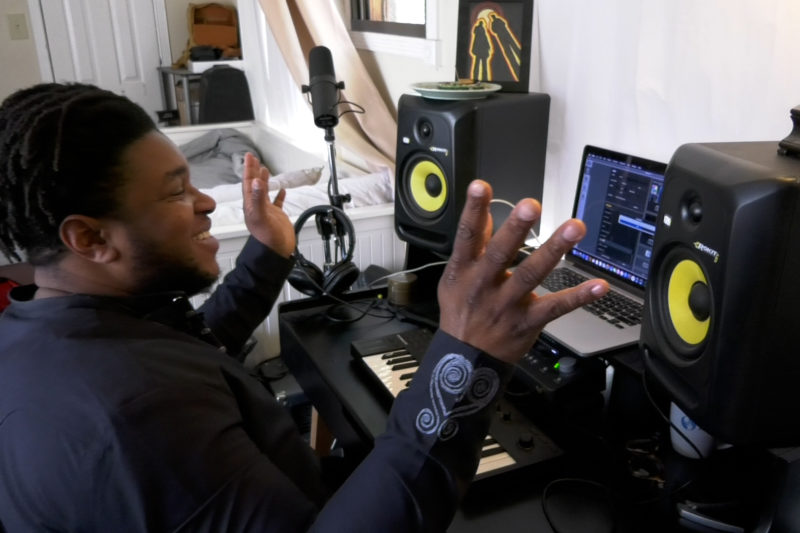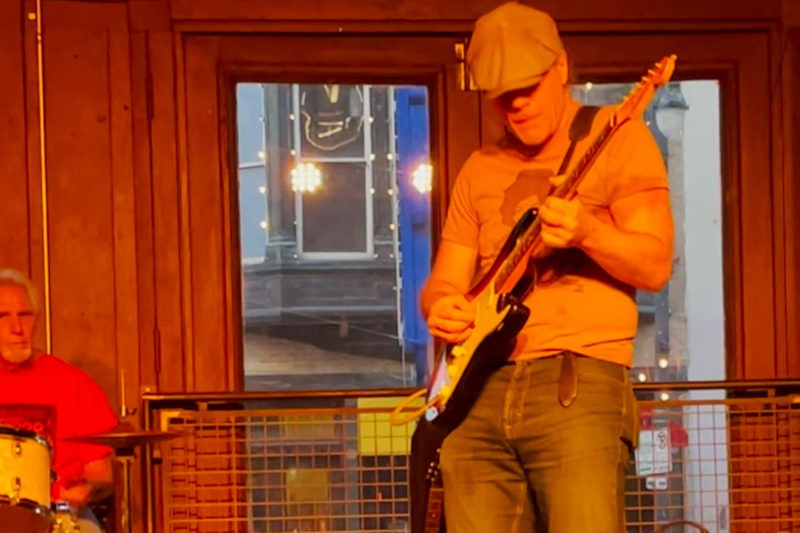Austin Musicians Get Pay Raise for City-Sponsored Performances
By Sam Stark
Reporting Texas TV
AUSTIN, Texas – Austin’s Music and Entertainment Division, part of the city’s Economic Development Department, raised wages earlier this month for musicians performing at city-sponsored events from $150 to $200 an hour.
Census data released last year shows Austin is one of the fastest-growing cities in the United States. With rapid growth comes increasingly unaffordable housing, which presents challenges for musicians like Kalu James who make Austin home.
He has lived in Austin for the last 14 years.
“One of the reasons I moved (to Austin) was because there were many opportunities to play shows and rent was considerably cheaper,” said James, the lead vocalist of Kalu and the Electric Joint. “It is getting increasingly difficult.”

Kalu James, of Kalu and the Electric Joint, plays music he recently recorded at his home studio in Austin. (Photo: Sam Stark, Reporting Texas TV)
The Music Commission of Austin unanimously recommended the raise. This is the first pay rate bump since 2016, when it went from $100 to $150.
Jonathon “Chaka” Mahone, a Music Commission member and musician, said if Austin wants to keep its “Live Music Capital of the World” title, it needs to support its musicians. That requires increased financial aid.
“We have to fight tooth and nail to get things passed that actually benefit musicians. There is no live music without musicians,” Mahone said.
Mahone said increases in the cost of living have made it particularly difficult for Black musicians, forcing many to leave the city.
“There’s no Live Music Capital without Black musicians,” Mahone said.
He hopes initiatives like the pay raise will make it easier for black musicians to live in Austin. Mahone also started an initiative called Diversity Awareness and Wellness in Action which has given more than $150,000 in financial support. “Dawa” is the Swahili word for “medicine”.
“You come and play at anything city-related, you’re gonna get $200 now, and that is, I think, a great move,” Mahone said.

Sonny Wolf plays guitar at Friends Bar on East Sixth Street in Austin. (Photo: Sam Stark, Reporting Texas TV)
Stephanie Bergara works for the Music and Entertainment Division of Austin’s Economic Development Department. She serves as a liaison between musicians and the government to advocate for their financial well-being.
She said the division is not in the position to tell private entities how they should compensate musicians performing at bars or clubs, but she hopes the pay bump “could be kind of like a guidepost, or a beacon, to push forward what would be perceived as a fair rate of pay.”
Although the city has become less affordable since he moved here, James said he would rather be in Austin than anywhere else in the world. He was born and raised in Nigeria and moved to the United States when he was 18. He has been singing since he was five.
While he thinks the pay raise is a nice gesture, he hopes more can be done for musicians who are not invited to perform at city-sponsored events.
“We should also make sure those musicians that are moving here, including the ones that have been here, get to benefit from that. More than one time,” James said.